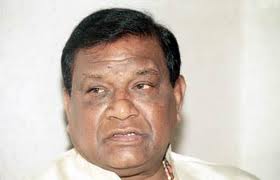New Delhi, April 28: Former BJP president Bangaru Laxman was sentenced today to four years in jail by a Delhi court for taking a bribe of Rs one lakh in a fictitious arms deal case 11 years ago.
Additional Sessions Judge Kanwal Jeet Arora sentenced 72-year-old Bangaru, also a former Union minister, holding him guilty of taking the bribe from fake arms dealers to recommend to the defence ministry to award them a contract to supply thermal binoculars to the Army.
The court awarded him the prison term, rejecting his plea for leniency and ordered that he be taken in custody to serve the sentence.
The court also imposed a fine of Rs one lakh on Bangaru, who had been caught on camera accepting the money in his chamber in the party headquarters and had to quit as its president shortly after the sting expose which had created a huge political storm.
"Balancing the twin interest of society and that of the convict, I am of the opinion that interest of justice would be met, if the convict is sentenced to undergo rigorous imprisonment for a term of four years and to pay a fine of Rs one lakh for the offence under Section 9 of the Prevention of Corruption Act," the judge said.
"It is often said that the accomplice of the crime of corruption is generally our own indifference. 'Sab chalta hai' syndrome has led us to the present situation, where we are, where nothing moves without an illegal consideration. People are forced to pay for getting even the right things done at right time," he added.
The judge, in his 14-page order on quantum of the sentence, said it is time to "shun" the "sab chalta hai" (It's OK, whatsoever!) attitude and courts should deal strictly with persons found guilty of corruption.
"It is right time to shun this attitude. When Parliament, taking note of the grim situation, has taken first step to sternly deal with such persons by increasing the quantum of punishment which can be imposed, it is the turn of the court to follow suit, so as to implement the will and intention of the legislature by interpreting the provisions of the PC Act as per the dictates of the apex court," the judge said.
"The problem of large-scale and rampant corruption, more particularly, the political corruption is weakening the political body and damaging the supreme importance of the law, governing the society,"
"The wisdom in the saying 'crime never pays' is belied by the factual realities of the day. The crime scenario in our country is distressingly disturbing as it has shattered hopes of both the plebeian and intellectual society about a possible rejuvenation of a value-based society," the judge said.
The court had on Friday convicted Bangaru observing that the CBI had established the case of accepting Rs one lakh bribe against him.
"Accused Bangaru Laxman stands convicted for the offence under Section 9 (taking gratification for exercise of personal influence with public servant) of the Prevention of Corruption Act," the judge had said.

Earlier
Fake arms deal case: Bangaru Laxman seeks leniency, CBI for maximum jail term
New Delhi, April 28: Former BJP president Bangaru Laxman, convicted for accepting Rs 1 lakh bribe in a fictitious arms deal case, today sought leniency on the ground of poor health, while the CBI sought the maximum punishment of five years for him.
72-year-old Bangaru, who was on Friday held guilty in the case, was produced from Tihar Jail before Special CBI Judge Kanwal Jeet Arora.
The court after hearing arguments on quantum of sentence in the case reserved its judgement for 2.30 PM.
Bangaru was convicted for taking bribe from fake arms dealer to recommend to the defence ministry to award them a contract to supply thermal binoculars to the Army.
He is convicted under Section 9 of the Prevention of Corruption Act which relates to "taking gratification, for exercise of personal influence with public servant" and entails a maximum punishment of five years imprisonment and a minimum of six months.
On being asked by the judge as to why Bangaru should be given minimum punishment of six months, the politician said he was not keeping well and has undergone bypass surgery twice.
"I have health problems as I have undergone bypass surgery twice and suffering from diabetes. I have never been involved in any such case before. So, I should be given the minimum sentence," Bangaru pleaded.
Seeking maximum punishment for Bangaru, CBI prosecutor Padmini Singh said corruption is spreading like anything in the society so it has to be dealt accordingly.
Citing various Supreme Court judgements on corruption, the prosecutor said corruption is rampant and it has to be dealt severely.
"CBI has been able to prove the case against Bangaru so we want maximum punishment for him under Section 9 of the Prevention of Corruption Act," the prosecutor said.
Opposing CBI's plea for maximum punishment, senior advocate Sunil Kumar, appearing for Bangaru, said in 40 years of his political career, he was "never ever involved in any such case" and no civil or criminal case has been lodged against him.
"He was holding important portfolio in the ministry. Once the tape was aired in news channels, Bangaru stepped down as a minister," the counsel said while seeking minimum sentence.






Comments
Add new comment